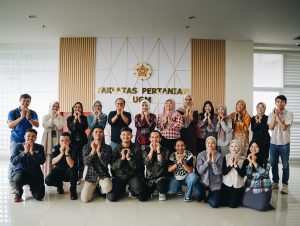
Yogyakarta, May 9, 2025 — The Faculty of Agriculture, Universitas Gadjah Mada, held a Sharing Session featuring Dr. Sri Nuryanti, S.T.P., M.P., Director of Food Insecurity Control at the National Food Agency (Bapanas) and an alumna of the Department of Agricultural Socio-Economics, UGM. The event carried the theme “Academic Contributions in the Pentahelix Model for Food Security Development” and took place at the Venture Room, 6th Floor, AGLC Building, Faculty of Agriculture UGM.
Running from 9:00 to 11:00 AM, the session was attended by lecturers and students of the Faculty of Agriculture UGM and officially opened by Prof. Subejo, S.P., M.Sc., Ph.D., Vice Dean for Research, Community Service, and Collaboration. Dr. Dyah Woro Untari, S.P., M.P., served as the moderator, facilitating a dynamic and engaging discussion.
In her presentation, Dr. Sri Nuryanti emphasized the importance of the pentahelix synergy—a collaborative framework involving academia, business, community, government, and media (ABCGM)—in strengthening national food security. She underlined the strategic role of academics in contributing research, innovations, and education to address pressing challenges such as food insecurity, stunting, food loss, and food waste.
Dr. Sri also outlined six key policy pillars of the National Food Agency, including government food reserve management, price stabilization, logistics system enhancement, alleviation of food and nutrition-insecure areas, promotion of local food consumption, and food quality and safety control. According to the National Food Security and Vulnerability Map, 62 regencies/cities are still classified as food-insecure areas, particularly in eastern Indonesia, the 3TP regions (disadvantaged, frontier, and outermost areas), and island regions.
Furthermore, she highlighted stunting as a multidimensional issue closely linked to low maternal education, limited access to nutritious food, and poor sanitation and health services. She stressed the need for interdisciplinary contributions, especially from students, through education, social campaigns, technology development, and market information systems.
The discussion session was highly interactive, with many participants enthusiastically raising questions during the Q&A session. Their active engagement reflected the academic community’s strong concern and commitment to addressing strategic food issues in Indonesia.
This event not only enriched academic insight but also reinforced collaborative spirit between higher education institutions and state agencies in building inclusive and sustainable food security.
This activity aligns closely with several points of the Sustainable Development Goals (SDGs), including:
SDG 2: Zero Hunger – The discussion emphasized the importance of strengthening food security, addressing food vulnerability, and improving community nutrition.
SDG 3: Good Health and Well-being – Topics on stunting, anemia, and healthy food consumption patterns underscored the relevance of this session to public health improvement efforts.
SDG 17: Partnerships for the Goals – The pentahelix collaboration model discussed in this session highlights the critical need for synergy among stakeholders in achieving sustainable development targets, especially in the food sector.

Author: Adhika Hafizh Prasada, S.P.
Admin of the Website for the Department of Agricultural Socio-Economics, Faculty of Agriculture, UGM
